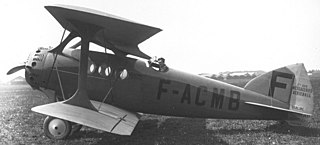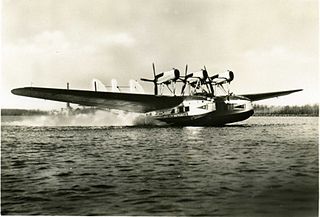
The Savoia-Marchetti S.73 was an Italian three-engine airliner that flew in the 1930s and early 1940s. The aircraft entered service in March 1935 with a production run of 48 aircraft. Four were exported to Belgium for SABENA, while seven others were produced by SABCA. The main customer was the Italian airline Ala Littoria.

The Savoia-Marchetti S.74 was a four-engine airliner developed by Savoia-Marchetti for Ala Littoria.

The Savoia-Marchetti SM.75 Marsupiale was an Italian passenger and military transport aircraft of the 1930s and 1940s. It was a low-wing, trimotor monoplane of mixed metal and wood construction with a retractable tailwheel undercarriage. It was the last of a line of transport aeroplanes that Alessandro Marchetti began designing in the early 1930s. The SM.75 was fast, robust, capable of long-range flight and could carry up to 24 passengers for 1,000 miles.

The Savoia-Marchetti SM.85 was an Italian monoplane dive bomber and ground-attack aircraft that served in small numbers in the Regia Aeronautica at the beginning of World War II. They were soon replaced in service by the Junkers Ju 87.

The Bleriot-SPAD S.33 was a small French airliner developed soon after World War I. The aircraft was a biplane of conventional configuration whose design owed much to the Blériot company's contemporary fighter designs such as the S.20. Four passengers could be accommodated in an enclosed cabin within the monocoque fuselage, and a fifth passenger could ride in the open cockpit beside the pilot. A great success, the S.33 dominated its field throughout the 1920s, initially on CMA's Paris-London route, and later on continental routes serviced by Franco-Roumaine.

The Savoia-Marchetti SM.83 was an Italian civil airliner of the 1930s. It was a civilian version of the Savoia-Marchetti SM.79 bomber.

The Savoia-Marchetti S.84 was an Italian twin-engined airliner developed in Italy, from the three-engined Savoia-Marchetti S.73; only the prototype was completed and the designation was re-used for the Savoia-Marchetti SM.84.

The Savoia-Marchetti SM.89 was an attack aircraft designed by Alessandro Marchetti and built by Savoia-Marchetti. Only one example was built, the prototype (MM.543).

The Savoia-Marchetti SM.62 was an Italian single-engine maritime patrol flying boat produced from 1926. It served with the Regia Aeronautica and with a number of foreign users, and was licence-produced in Spain and the Soviet Union. Some of the Spanish aircraft were still in service during the Spanish Civil War

The Fiat G.12 was an Italian transport aircraft of World War II.

The Savoia-Marchetti S.59 was a 1920s Italian reconnaissance/bomber flying boat designed and built by Savoia-Marchetti for the Regia Aeronautica.

The SIAI-Marchetti SM.102 was a 1940s Italian light transport cabin monoplane designed and built by SIAI-Marchetti.
The SIAI-Marchetti SM.101 was a 1940s Italian single-engined light transport cabin monoplane designed and built by SIAI-Marchetti.

The Savoia-Marchetti S.66 was a 1930s Italian twin-hull flying boat designed and built by Savoia-Marchetti as an enlarged development of the S.55.

The Savoia-Marchetti S.56 was an Italian single-engine biplane flying boat trainer and tourer, built by Savoia-Marchetti.

The Savoia-Marchetti S.72 was an Italian three-engine transport monoplane designed and built by Savoia-Marchetti as an enlarged and strengthened version of the earlier S.71. The S.72 was a three-engine, high-wing cantilever monoplane with a fixed tailwheel landing gear. Designed as a heavy bomber, the prototype was first flown in 1934 powered by three 410 kW (550 hp) Alfa Romeo licence-built Bristol Pegasus radial engines.

The Spartan C4 was an American four-seat cabin monoplane designed and built by the Spartan Aircraft Company.

The Dornier Do K was a German commercial passenger and freight monoplane, designed by Claude Dornier and built by Dornier Flugzeugwerke. Only three prototypes of different designs were built and the type was not a commercial success.

The Walter Castor was a Czechoslovakian seven-cylinder, air-cooled radial engine for powering aircraft that was developed in the late 1920s. The Super Castor was a nine-cylinder development. Castor I production began in 1928, Castor II in 1932 and the Castor III in 1934.

The SkyDancer SD-260 was an American aerobatic homebuilt biplane that was designed and produced by SkyDancer Aviation of Louisville, Kentucky, introduced in the mid-1990s. When it was available the aircraft was supplied as a kit.




















